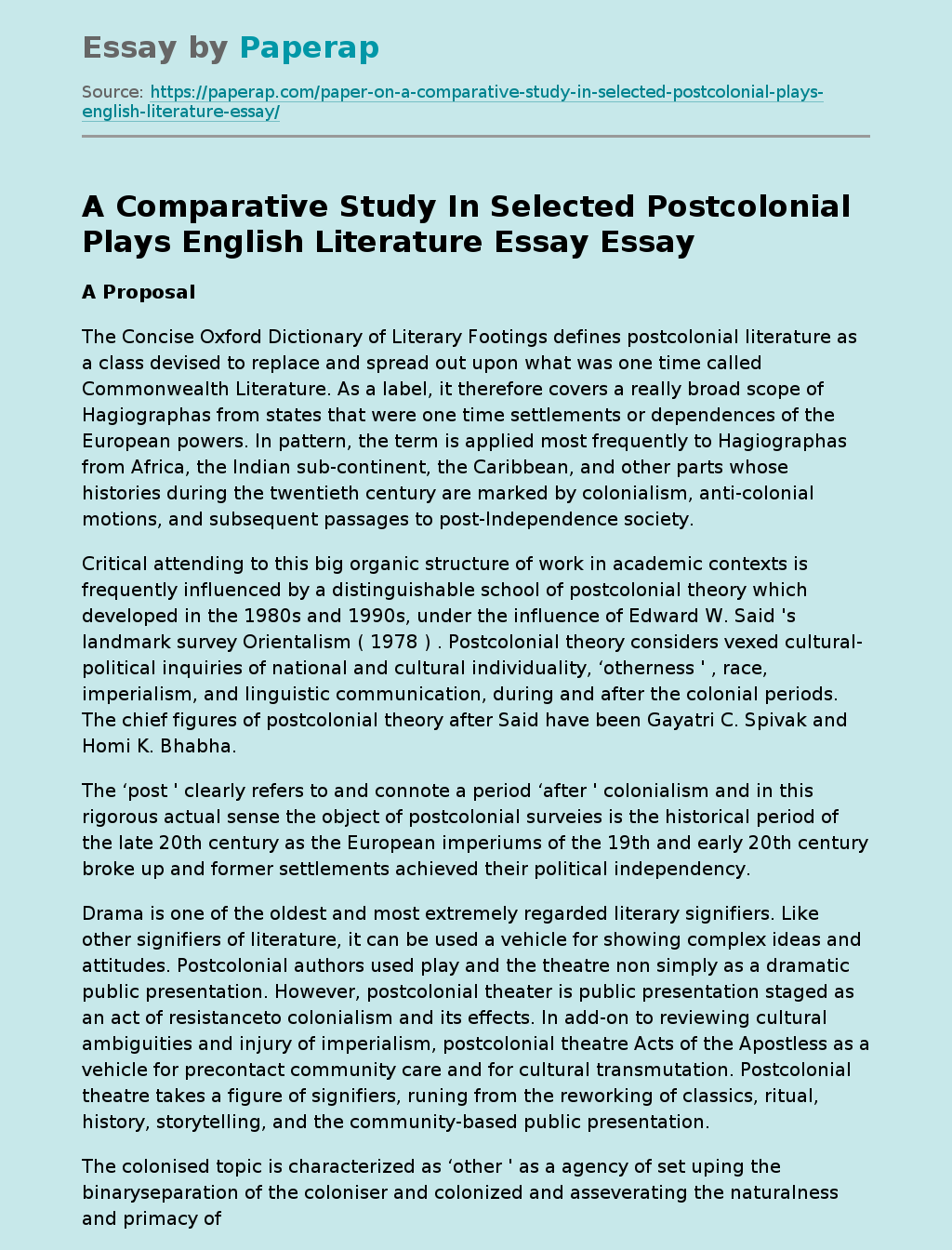A Comparative Study In Selected Postcolonial Plays English Literature Essay
The Concise Oxford Dictionary of Literary Footings defines postcolonial literature as a class devised to replace and spread out upon what was one time called Commonwealth Literature. As a label, it therefore covers a really broad scope of Hagiographas from states that were one time settlements or dependences of the European powers. In pattern, the term is applied most frequently to Hagiographas from Africa, the Indian sub-continent, the Caribbean, and other parts whose histories during the twentieth century are marked by colonialism, anti-colonial motions, and subsequent passages to post-Independence society.
Critical attending to this big organic structure of work in academic contexts is frequently influenced by a distinguishable school of postcolonial theory which developed in the 1980s and 1990s, under the influence of Edward W. Said ‘s landmark survey Orientalism.
Postcolonial theory considers vexed cultural-political inquiries of national and cultural individuality, ‘otherness ‘ , race, imperialism, and linguistic communication, during and after the colonial periods. The chief figures of postcolonial theory after Said have been Gayatri C.
Spivak and Homi K. Bhabha. The ‘post ‘ clearly refers to and connote a period ‘after ‘ colonialism and in this rigorous actual sense the object of postcolonial surveies is the historical period of the late 20th century as the European imperiums of the 19th and early 20th century broke up and former settlements achieved their political independency. Drama is one of the oldest and most extremely regarded literary signifiers. Like other signifiers of literature, it can be used a vehicle for showing complex ideas and attitudes. Postcolonial authors used play and the theatre non simply as a dramatic public presentation.
However, postcolonial theater is public presentation staged as an act of resistanceto colonialism and its effects. In add-on to reviewing cultural ambiguities and injury of imperialism, postcolonial theatre Acts of the Apostless as a vehicle for precontact community care and for cultural transmutation. Postcolonial theatre takes a figure of signifiers, runing from the reworking of classics, ritual, history, storytelling, and the community-based public presentation. The colonised topic is characterized as ‘other ‘ as a agency of set uping the binaryseparation of the coloniser and colonized and asseverating the naturalness and primacy of the colonizing civilization and universe position. In postcolonial theory, it can mention to the colonized others who are marginalized by imperial discourse, identified by their difference from the Centre and, possibly crucially, go the focal point of awaited command by the imperial ‘ego ‘ .
The term “othering” was coined by Gayatri Spivak for the procedure by which imperial discourse creates its ‘others ‘ . This thesis attempts to follow the usage of play by a choice of postcolonial playwrights who wrote in English and in Arabic to stand for the self/other or the colonizer/colonized dialectic. The authors selected are of the most celebrated in modern postcolonial literature whose plants are among its landmarks. The thesis besides attempts to demo how those different playwrights used this genre to show the self/other dialectic and what are the countries of resemblance/difference among them. The thesis falls into an debut, three chapters and a decision.
Chapter One is an Introduction divided into two subdivisions. Section one attempts to specify postcolonial literature and sheds visible radiation on critics who are the innovators of this subject, viz. Edward Said, Gayatri C. Spivak, and Home K. Bhabha concentrating on the construct of the “other” . Section two sheds light on postcolonial theater and how it is used to counter colonialism. Chapter Two is divided into four subdivisions. Each subdivision discusses a postcolonial drama written in English. The dramas selected are: Wole Soyinka ‘s The Swamp Dwellers, Derek Walcott ‘s The Sea at Dauphin, Athol Fugard ” s The Island, and Brian Friel ‘s Translations. Chapter Three is besides divided into four subdivisions and in each subdivision one drama written in Arabic is discussed. The dramas selected for survey are: Sa’dun Al-Ubeidy ‘s Jisr Al-‘Adu, Sabah Atwan Al-Zaidy ‘s Raseef Al-Ghathab, Alfred Faraj ‘s Al-Nar Washington Al-Zaitun, and Bneian Salih ‘s Sirat S. Chapter Four attempts to demo the similarities/differences between the dramas discussed. The decision sums up the findings of the survey.
References
- Garuba, Harry. 2001. The Island Writes Back: Discourse/Power and Marginality in Wole Soyinka ‘s “ The Swamp Dwellers, ” Derek Walcott ‘s “ The Sea at Dauphin, ” and Athol Fugard ‘s “ The Island ” . Research in African Literatures 32, no. 4 ( Winter ) : 61-76. hypertext transfer protocol: //www.jstor.org/stable/3820807 ( accessed: 08/11/2009 ) .
- Olaniyan, Tejumola. 1992. Dramatizing Postcoloniality: Wole Soyinka and Derek Walcott. Theatre Journal 44, no. 4, Disciplines of Theatre: Theory/Culture/Text ( Dec. ) : 485-499. hypertext transfer protocol: //www.jstor.org/stable/3208770 ( accessed 08/11/2009 ) .
- Boltwood, Scott. 2002. Brian Friel: Staging the Struggle with Nationalism. Irish University Review 32, no. 2 ( Autumn – Winter ) : 303-318. hypertext transfer protocol: //www.jstor.org/stable/25504911 ( accessed: 09/11/2009 ) .
A Comparative Study In Selected Postcolonial Plays English Literature Essay. (2017, Sep 14). Retrieved from https://paperap.com/paper-on-a-comparative-study-in-selected-postcolonial-plays-english-literature-essay/

